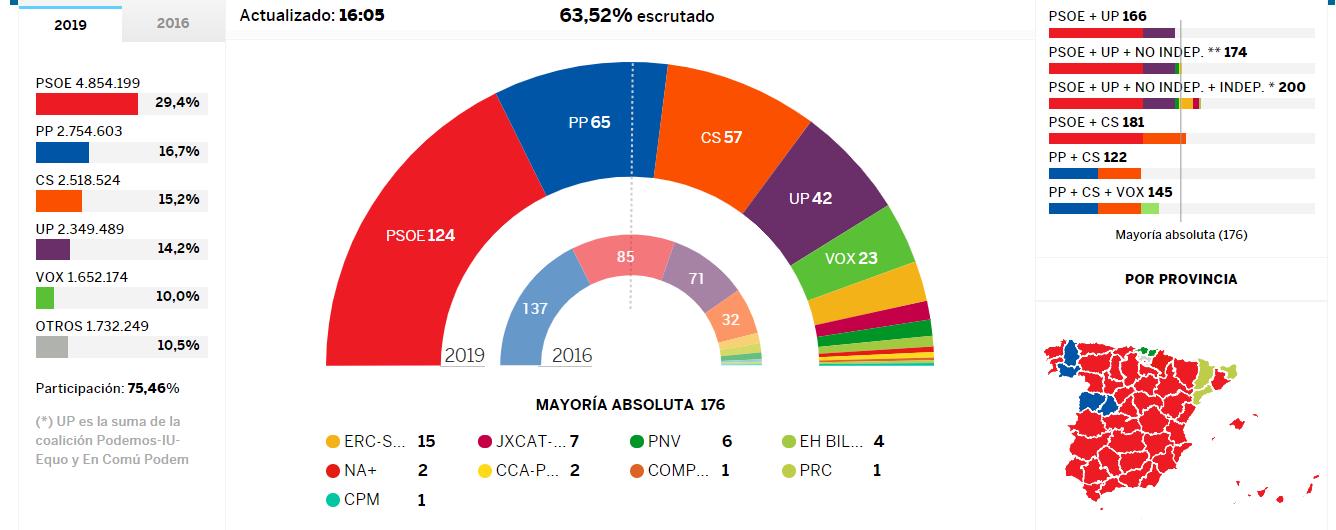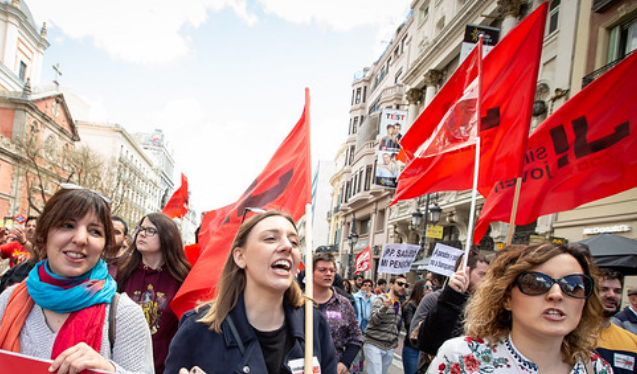The right has been thoroughly defeated in the Spanish general elections, which took place yesterday. The masses mobilised to the polling stations: voter turnout was at an impressive high of 75.8 percent – a nine percentage points increase on the 2016 elections. Voters mobilised in such a huge way in order to block the right-wing parties from forming a government.
Across the country as a whole, votes for PSOE and Unidas Podemos amounted to 43 percent against 42.8 percent for right-wing parties (a difference of 60,000 votes). In Catalonia, if we add the vote of the Catalan pro-independence left, the left won 65.5 percent of the vote, which was its highest share nationally.
The elections demonstrate a sharp polarisation in society between the right and left. The whole election campaign revolved around the attempt of the three right-wing parties, PP, Ciudadanos and the far right Vox, to repeat the government coalition they had formed in Andalucía after the regional elections there. The PSOE ran a campaign based on the idea of counterposing “the past against the future”, the “Spain of reaction versus the Spain of progress”. This is what led to a high voter turnout and support for left-wing parties, showing a strong class consciousness in the Spanish working class, who recognise the threat posed by the PP, Ciudadanos and Vox, and wanted to block a reactionary government with the participation of the far right.
As a result, PSOE (Socialist Party) has come out on top. The Socialist Party received 28.7 percent of the vote, winning 123 seats in parliament. Although this is a significant increase from the 85 seats that PSOE won in the 2016 elections, it is still not enough to form a majority government. PSOE was seen as the best way to ensure the right was not victorious and so the party garnered the majority of the left vote instead of Unidas Podemos (UP).
Major defeat for PP
In contrast, this has been the worst election ever for the main right-wing party PP (Popular Party). They only secured 16.7 percent of the vote and 66 seats. This is a significant drop from the 137 seats won in the 2016 elections when Rajoy became the president. The PP has dominated the right in Spain for nearly 40 years but are now showing signs of weakness. In the Basque Country, for example, the PP no longer have a single MP and in Catalonia they have lost five MPs, with only one remaining.
 The right suffered a major defeat, with voters mobilising to block them from forming a government / Image: fair use
The right suffered a major defeat, with voters mobilising to block them from forming a government / Image: fair use
After Rajoy was disgraced in a vote of no confidence that saw the PP ousted from government in June last year, they acquired a fresh-faced leader in the young Pablo Casado. Under Casado, the PP have been moving to the right in a desperate attempt to stop haemorrhaging votes to Ciudadanos (the ultra-liberal right-wing party) and Vox (the far-right party). However, this strategy has clearly backfired and ended up strengthening Vox.
Vox gains a foothold
Where PP have lost, Vox gained. Vox received 10.2 percent of the votes and a total of 24 seats in parliament. This is a significant increase from the minuscule 0.2 percent of votes that they won in the 2016 elections. Vox formed six years ago and is the first openly far-right party to emerge since the fall of the Franco dictatorship in 1975. They are pro-bullfighting, anti-immigration, anti-women's-rights and pose themselves as an anti-establishment party. They clearly represent the most reactionary elements of Spanish society and have gained ground in rural areas and particularly amongst former PP voters in well-off areas.
For instance, in the wealthier Salamanca district in Madrid, the three right-wing parties came first, second and third, receiving a combined vote of 71 percent, slightly down from 75 percent in 2016, but Vox came third, with 17.8 percent of the vote: well above their national average of 10 percent. Meanwhile, in the working-class Madrid district of Puente Vallecas, PSOE came first, with UP second getting a combined vote of over 63 percent, while Vox received only 8 percent of the vote, below their national average.
Vox caused a stir in December last year when they received almost 400,000 votes in the Andalucía regional elections. Although this was largely due to the highest voter abstention in the region since 1990, with only 58 percent voter turnout, the result concerned the Spanish left. Opinion polls were expecting Vox to get between 11-13 percent of the vote in the general election. In Andalucía, Vox did in fact get over 600,000 votes and increased their percentage to 13.38 percent. In response to Vox raising its ugly head, the voter turnout in Andalucía for the general elections yesterday shot up to 73.3 percent. Vox were hoping to do much better, riding on the back of their success in the regional elections, but they were blocked by votes for the left. Ciudadanos too had ambitions of overtaking the PP to become the major right-wing party in Spain, but only secured 15.8 percent of the vote.
Collapse of Podemos
Podemos has also suffered a drop in support in these elections. They placed fourth, behind Ciudadanos and PP, with a mere 14.3 percent and 42 seats. This is a seven-point drop from 2016, when they had 71 seats. This loss of votes is a result of Podemos’ failed political strategy. In June last year, they spearheaded the motion of no confidence, which brought down the PP Rajoy government, and voted for Sánchez to become PM. They had a real opportunity to push a radical programme on Sánchez, holding him to account for cuts and lack of reforms. This would have been possible by combining parliamentary pressure with mobilisations in the streets. Instead, they have subordinated themselves to PSOE and shown no clear differentiation in their programme that would have rallied voter support to their camp.
 Podemos suffered a drop in support in these elections, the result of subordinating themselves to PSOE rather than holding them to account and distinguishing themselves / Image: Flickr, Marc Puig i Perez
Podemos suffered a drop in support in these elections, the result of subordinating themselves to PSOE rather than holding them to account and distinguishing themselves / Image: Flickr, Marc Puig i Perez
In practice, they played second fiddle to Sánchez. The UP leaders have moderated their formerly radical language and reduced their militancy. During the election campaign, Pablo Iglesias (Podemos’ leader) was seen advocating more left-wing policies, but it was too little, too late. His actions over this past period do not match his rhetoric. Therefore, a section of left-wing voters who had backed UP before, now got behind PSOE, as they saw it as a more secure way to ensure the right’s path to power was blocked.
What next?
Although the Socialist Party has won, its leader, Sánchez is a moderate who was backed by the FT, The Economist and the New York Times, who all praised his moderation and his preference for compromise. He could secure a numerical majority in parliament through an alliance with Ciudadanos, which is also what the ruling class would prefer. However, Ciudadanos leader Albert Rivera has made it clear that he does not want to ally with the socialists: their goal to be the main right-wing party would be severely damaged if he were to do so. Furthermore, Sánchez’ supporters made it very clear last night at his acceptance speech that they will not tolerate any alliance with the right. Chants from the crowd of “Not with Rivera!” were met by uncomfortable smiles from the new president who said he would not put up “red tape” (“cordones sanitarios”) around the option of an alliance with Ciudadanos. Instead he stated that his only condition would be that a coalition partner “respect the constitution”.
 The masses who rallied to block the right are more radical than Sanchez. There are likely to be big mobilisations in the future against the cuts PSOE will be forced to carry out / Image: PSOE EDIIMA20170618 0312 21
The masses who rallied to block the right are more radical than Sanchez. There are likely to be big mobilisations in the future against the cuts PSOE will be forced to carry out / Image: PSOE EDIIMA20170618 0312 21
Interestingly, the other chants during the speech were: “¡No pasarán!” (“they will not pass!”): an anti-fascist chant, harking back to the defence of Madrid in the Spanish Civil War, and “¡Sí se puede!” (“Yes we can!”) which is a Podemos slogan. These chants reflect the mood amongst many PSOE voters, which is far more radical than Sánchez’ political position. At the moment, all parties are waiting for the municipal, regional and European elections, which will all take place on the same day in May, to see which way the voters go. All talk of government formation and coalitions will be postponed. Regardless, a new recession is on the horizon, and PSOE will need to carry out more austerity measures in order to serve the interests of the ruling class. Sánchez may make cosmetic changes to appeal to the left, but nothing that threatens challenging the EU spending and deficit limits.
What we are likely to see in this next period is a wave of new mobilisations in the streets against the counter-reforms or cuts that Sánchez will be forced to implement. In this scenario, Podemos needs a strategy centred around mobilisations in the streets on issues like housing, cuts in social spending, labour laws, democratic and women’s rights, etc. They must learn from their mistakes and not continue down the road of subordination to PSOE in parliament. They need to challenge PSOE and hold them to account if they truly want to represent the interests of the working class.

